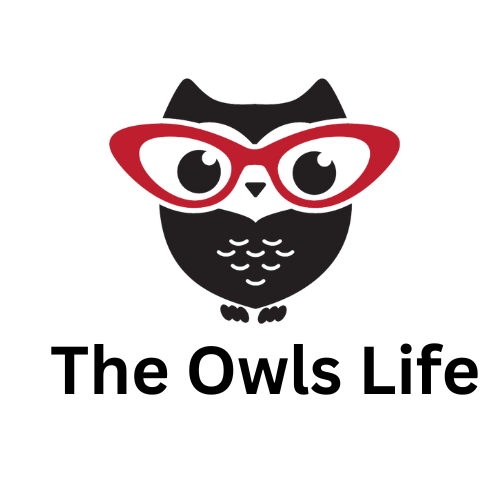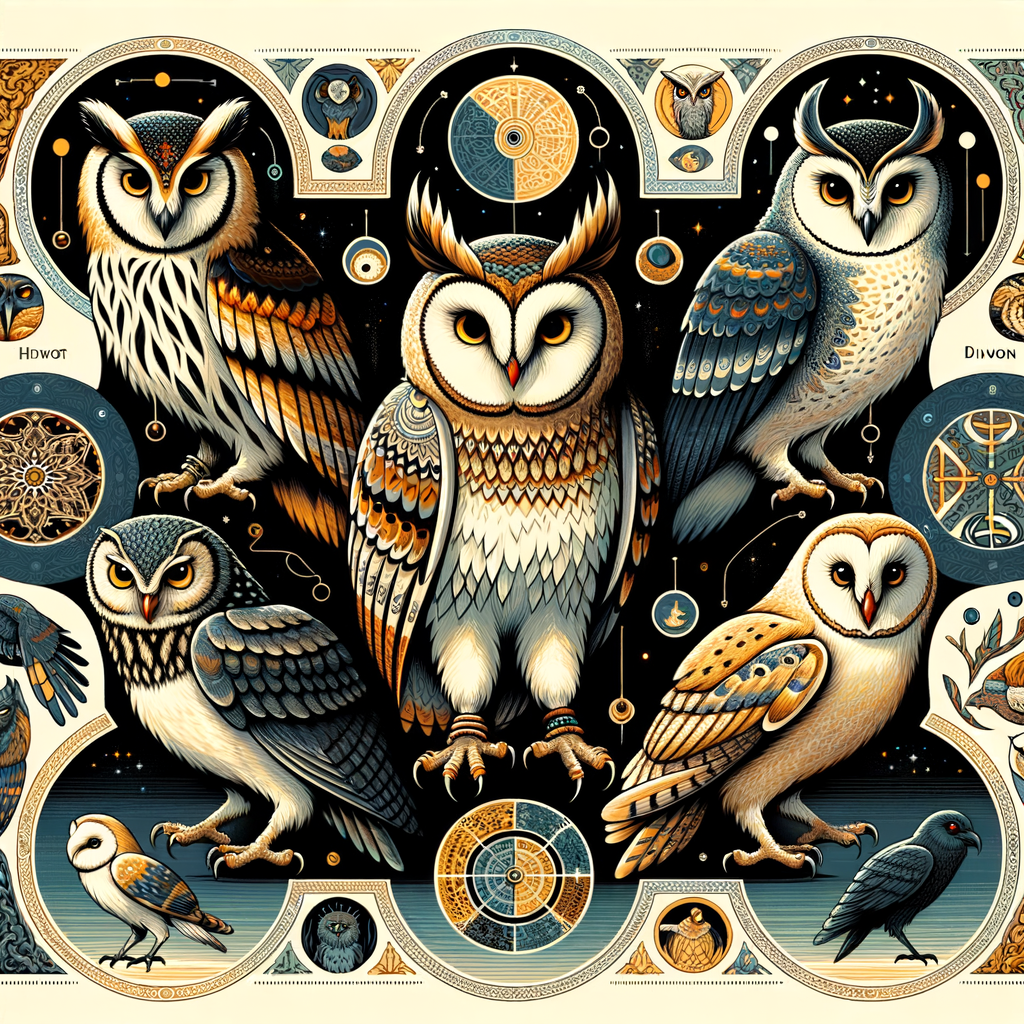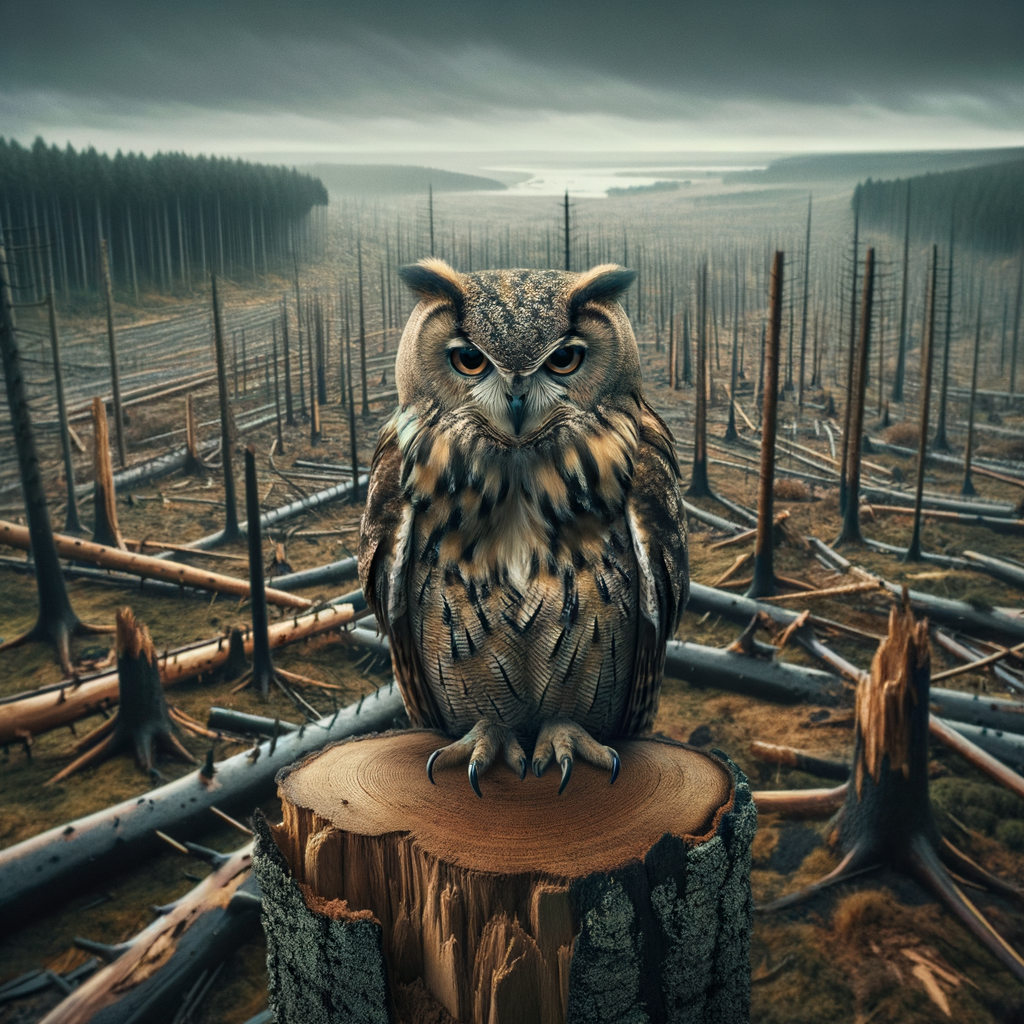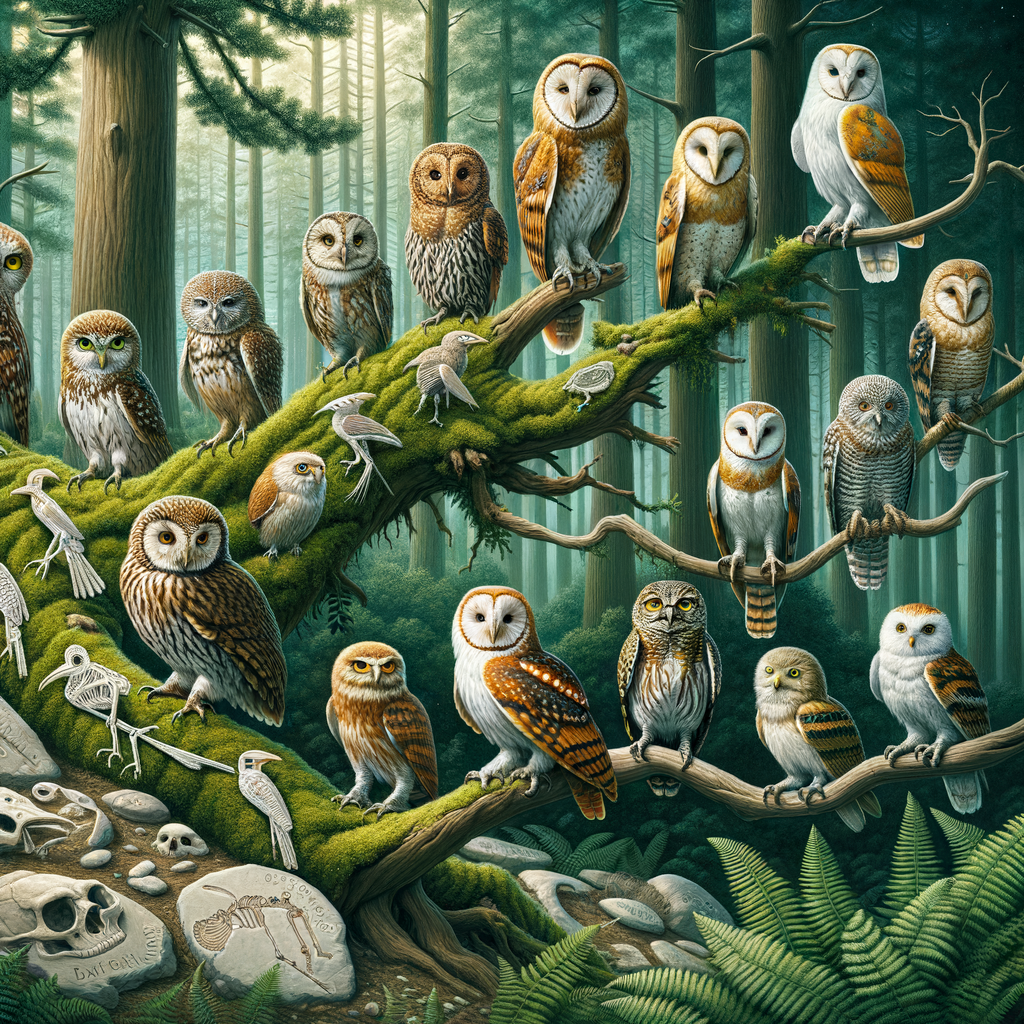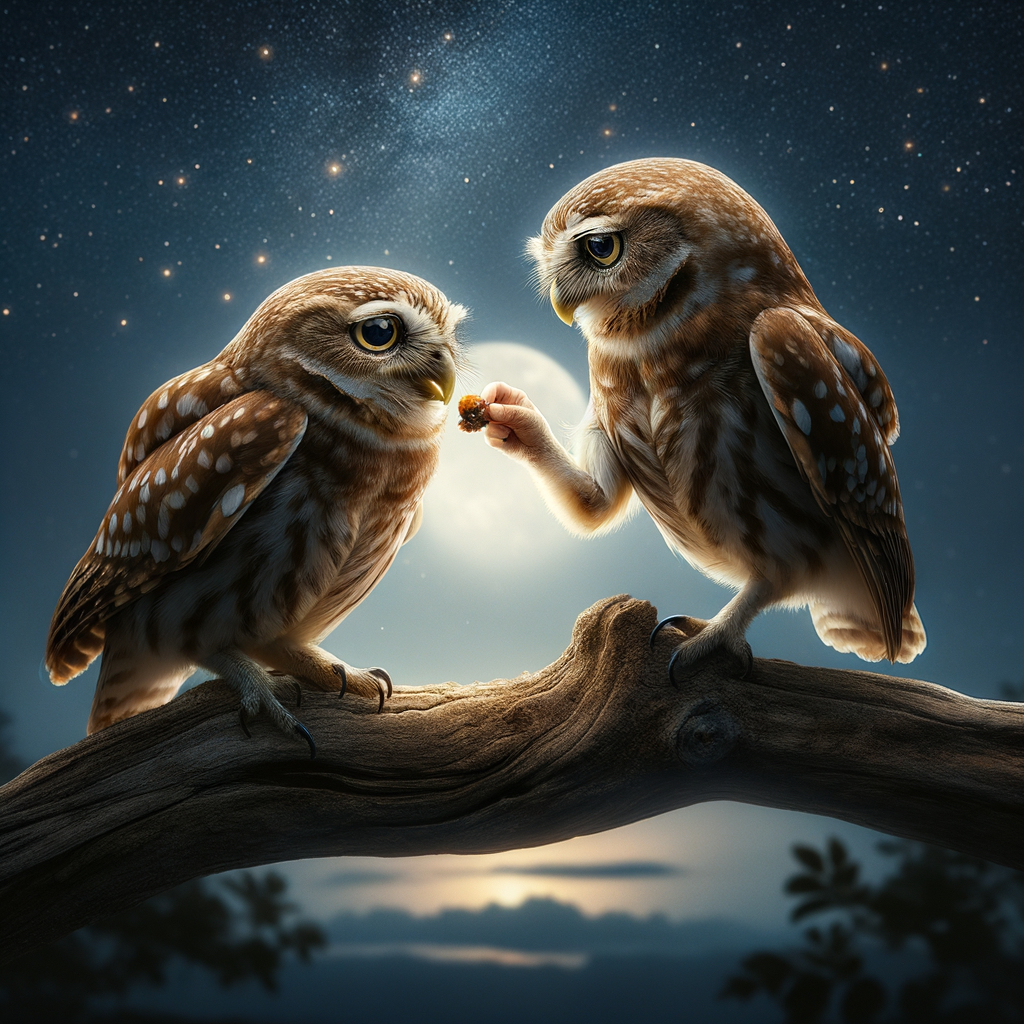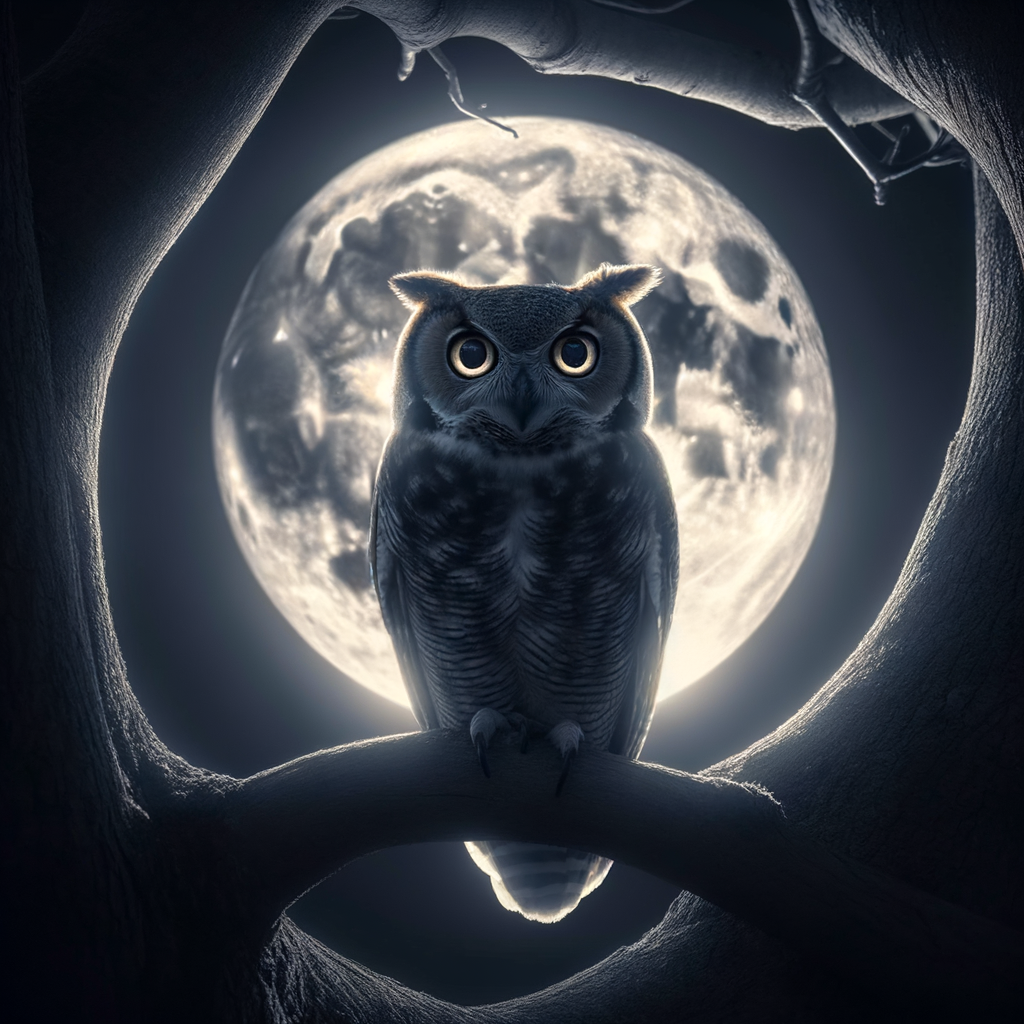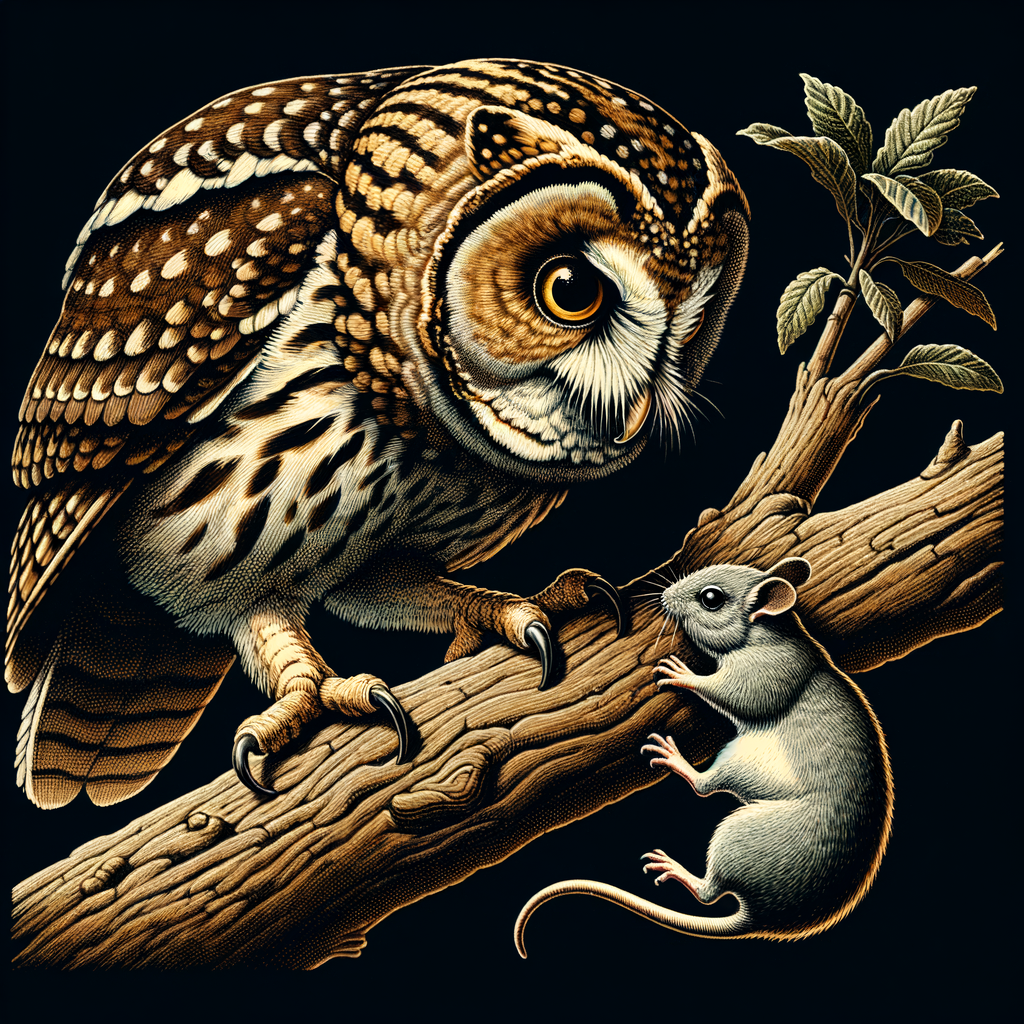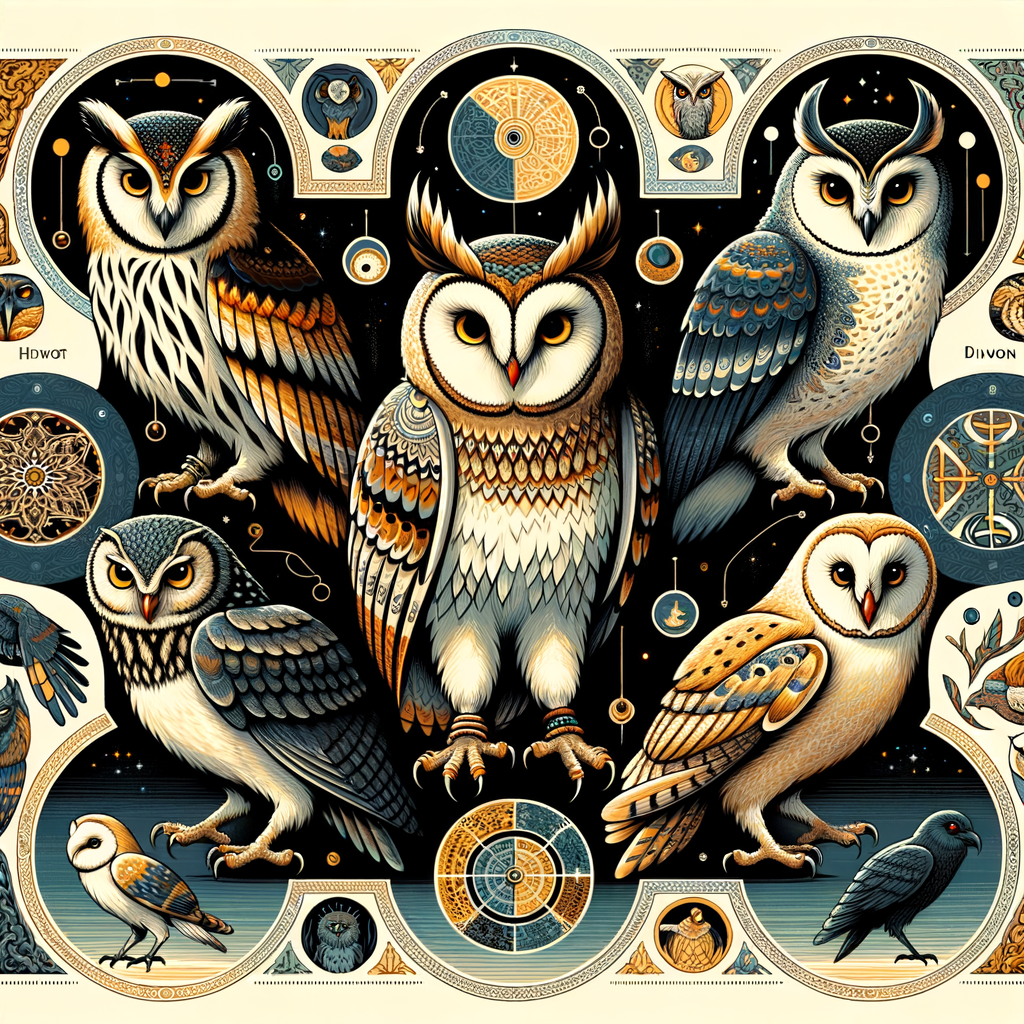
Introduction to Owls in Mythology
When we think of owls, we often imagine them as wise, mysterious creatures of the night. But did you know that owls have played significant roles in various mythologies and folklore tales worldwide? In this article, we will delve into the fascinating world of owls in mythology.
-
- Overview of the Role of Owls in Various Mythologies
Owls have been revered and feared in equal measure in different cultures. They have been associated with wisdom, prophecy, and even death. For instance, in Greek mythology, the owl was a symbol of Athena, the goddess of wisdom. On the other hand, in certain Native American tribes, owls were seen as harbingers of death or ill omen. The diverse interpretations of owls in mythology highlight their significance and the intrigue they inspire.
-
- Significance of Owls in Folklore Tales Worldwide
Not just in mythology, owls have also held a prominent place in folklore tales across the globe. From being wise advisors to symbols of foresight, owls have been portrayed in various lights. In Japanese folklore, owls are seen as lucky and protective. In contrast, in some African cultures, they are associated with witchcraft. These tales, passed down through generations, continue to shape our perceptions of these fascinating creatures.
As we explore further, we will delve into specific folklore tales featuring owls, understand the symbolism behind them, and discover how these stories have shaped our understanding of owls. So, let’s embark on this exciting journey into the world of owls in mythology and folklore.
Owl Symbolism in Folklore
In the world of folklore, owls hold a special place. They are often seen as symbols of wisdom, mystery, and transition. Let’s delve into the Western cultural beliefs about these fascinating creatures.
Western Cultural Beliefs about Owls
In Western cultures, owls have been associated with a variety of beliefs and stories. We will focus on two of the most prominent ones: Greek mythology and Celtic and Norse folklore.
-
- Symbolism of Owls in Greek Mythology
In ancient Greek mythology, the owl was considered a sacred creature. It was closely associated with Athena, the goddess of wisdom and warfare. The Greeks believed that an owl flying over a battlefield was a sign of victory for the army below. They also believed that the owl could illuminate the truth, making it a symbol of knowledge and insight.
-
- Owls in Celtic and Norse Folklore
In Celtic and Norse folklore, owls were seen as mysterious and even ominous creatures. The Celts associated owls with the Otherworld and believed they were messengers from the spirit realm. In Norse mythology, owls were thought to be the companions of witches and wizards. Despite these darker associations, owls were also seen as symbols of wisdom and knowledge, much like in Greek mythology.
In summary, owls have been revered and feared in equal measure in Western cultures. They are seen as symbols of wisdom and knowledge, but also as omens of change and transition. This dual nature of owls makes them fascinating subjects in folklore and mythology.
Eastern Cultural Beliefs about Owls
As we delve into the eastern part of the globe, we find that owls hold a unique place in the folklore and mythology of various cultures. Let’s explore the legends and beliefs associated with owls in Japanese, Chinese, and Indian cultures.
- Owl Legends in Japanese and Chinese Folklore
In both Japanese and Chinese cultures, owls are seen as symbols of luck and protection against suffering. The Japanese word for owl, “Fukurou,” is a homonym for “protection from hardship” and “luck”. This has led to the creation of owl amulets, believed to ward off hardships and bring good fortune.
Chinese culture, on the other hand, views owls as an embodiment of wisdom and knowledge. The owl is often depicted in traditional Chinese paintings, symbolizing the pursuit of wisdom. However, it’s also important to note that in some regions, owls are considered a bad omen, signifying death or illness.
- Owls in Indian Mythology
Indian mythology presents a different perspective on owls. In India, the owl is associated with Lakshmi, the goddess of wealth and prosperity. During the festival of Diwali, images of owls are depicted alongside Lakshmi, symbolizing wealth, wisdom, and good luck. However, in some parts of India, owls are also considered a symbol of ill omen and are associated with witchcraft and sorcery.
Despite the varied interpretations, one thing is clear: the owl holds a significant place in the folklore and mythology of different cultures. Whether seen as a symbol of wisdom, a bringer of luck, or a harbinger of ill fortune, the owl’s presence in these stories reflects its enduring influence and the fascination it continues to inspire.
| Culture | Symbolism |
|---|---|
| Japanese | Protection, Luck |
| Chinese | Wisdom, Knowledge, Death (in some regions) |
| Indian | Wealth, Wisdom, Good Luck, Ill Omen (in some regions) |
Global Folklore about Owls
As we traverse the globe, we find that owls hold a unique place in various cultures. In this section, we will explore the fascinating tales of owls in Africa.
Owl Tales in Africa
Africa, with its rich cultural diversity, has a plethora of folklore about owls. Let’s delve into the intriguing tales from Egyptian mythology and Sub-Saharan cultures.
-
- Traditional owl stories in Egyptian mythology
In ancient Egyptian mythology, owls were considered guardians of the underworld and protectors of the dead. This belief stemmed from the owl’s nocturnal nature and its ability to see in the dark, which was associated with the mysterious realm of the afterlife. The owl was often depicted alongside the god of the dead, Osiris, in ancient Egyptian art.
-
- Owl legends in Sub-Saharan cultures
Sub-Saharan cultures have a diverse range of beliefs about owls. In some communities, owls are seen as harbingers of doom or death, while in others, they are revered as wise and powerful creatures. For instance, in the Zulu culture of South Africa, the owl is associated with witchcraft, but in the Akan culture of Ghana, the owl is a symbol of wisdom and knowledge.
These tales underscore the diverse interpretations of owls in different African cultures. Whether feared or revered, owls undeniably hold a significant place in African folklore.
Owl Tales in the Americas
As we journey through the world of owl folklore, let’s now turn our attention to the Americas. The owl holds a special place in the hearts and minds of the people here, with tales and myths that are as diverse as the cultures themselves.
-
- Owl Myths in Native American Cultures
In many Native American tribes, owls are seen as harbingers of change or even death. For example, the Hopi tribe believes that the owl is a god of the dead, guiding spirits to the afterlife. However, not all tribes view the owl with fear. The Ojibwe tribe, for instance, sees the owl as a symbol of protection against evil spirits.
One popular Native American tale tells of a brave owl who outwitted a coyote, saving the other animals from his mischief. This story highlights the owl’s wisdom and cunning, qualities highly valued in many Native American cultures.
-
- Owl Stories in Latin American Folklore
Moving further south, we find that Latin American cultures also have rich tales involving owls. In Mexican folklore, the owl, or “lechuza,” is often portrayed as a witch who can transform into an owl. This belief stems from the ancient Aztec goddess, Cihuacoatl, who was often depicted as an owl.
In contrast, in some parts of Brazil, the owl is seen as a lucky charm. A popular Brazilian saying goes, “When the owl sings, the Indian dies,” which means that the owl’s song brings wisdom and enlightenment.
These tales and myths from the Americas show us the many faces of the owl, from a feared harbinger of death to a revered symbol of wisdom. They remind us that the owl, like all creatures, can be seen in many different lights depending on our cultural lens.
| Culture | Perception of Owls |
|---|---|
| Native American | Harbingers of change or death, symbols of wisdom |
| Mexican | Witches in disguise, symbols of ancient goddesses |
| Brazilian | Lucky charms, bringers of wisdom |
As we continue our exploration of owl tales around the world, remember that these stories are more than just myths. They are reflections of our human fears, hopes, and values, woven into the fabric of our cultures.
International Owl Myths
As we journey across the globe, we encounter a myriad of fascinating owl myths and legends. These tales not only reveal the cultural significance of owls but also highlight the unique interpretations of these birds in different societies. Let’s delve into some of these captivating stories.
Unique Owl Legends Around the World
From the Australian Outback to the Polynesian Islands, owls have been woven into the fabric of many cultures’ folklore. Here are two such intriguing tales:
-
Owl Myths in Australian Aboriginal Folklore
In Australian Aboriginal folklore, owls are often associated with wisdom and knowledge. One popular tale tells of a wise old owl who taught the Aboriginal people how to hunt and gather food. This owl, known as ‘Mopoke’, was revered for its wisdom and was believed to be a guide for the spirits of the deceased.
The Mopoke owl is often depicted in Aboriginal art, symbolizing wisdom, guidance, and the spiritual world. This tale underscores the importance of owls in Aboriginal culture and their role as a bridge between the physical and spiritual realms.
-
Owl Tales in Polynesian Mythology
In Polynesian mythology, owls are considered sacred and are often associated with deities. One such tale is about the owl god, ‘Ruru’. Ruru was believed to be the guardian of the underworld and was often invoked for protection during night-time journeys.
Polynesians believed that the hooting of an owl was a sign from Ruru, warning them of impending danger or guiding them on their path. This tale highlights the reverence Polynesians have for owls and their belief in the owl’s protective powers.
These tales from Australian Aboriginal and Polynesian cultures illustrate the diverse ways in which owls are perceived around the world. They serve as a testament to the enduring power and fascination of owl myths in various cultures.
Case Studies: Folklore Tales Featuring Owls
Let’s dive deeper into some specific folklore tales that feature owls. We’ll explore two main stories: the myth of Athena and the owl, and the role of the owl in Native American creation stories.
-
Analysis of the Owl’s Role in the Myth of Athena
The owl is a significant symbol in Greek mythology, particularly in the myth of Athena, the goddess of wisdom. Athena’s companion was often depicted as an owl, symbolizing wisdom and knowledge.
In this myth, the owl is seen as a protector, guiding Athena through her journeys. The owl’s ability to see in the dark was considered a metaphor for Athena’s ability to see through deception and illusion. This association between the owl and wisdom has endured over the centuries and is still prevalent in modern interpretations of the myth.
-
Examination of the Owl in Native American Creation Stories
In Native American folklore, the owl holds a different but equally important role. Many tribes view the owl as a symbol of death and rebirth. It’s often associated with the creation of the world and the cycle of life.
For instance, in some Native American creation stories, the owl is seen as a guardian of the earth, watching over the night while other creatures sleep. Its ability to see in the dark is viewed as a powerful skill, symbolizing insight and intuition.
These stories highlight the owl’s role as a spiritual guide and protector, emphasizing its importance in the natural world and the spiritual realm.
These case studies provide a glimpse into the diverse roles owls play in different cultures’ folklore. Whether as a symbol of wisdom or a guardian of the earth, the owl’s presence in these stories underscores its enduring significance in human mythology and belief systems.
Key Takeaways: Understanding Owl Stories in Folklore
As we delve into the world of owls and their significance in folklore, there are a few key insights that stand out. These insights help us understand the universal symbolism of owls and reflect on the cultural significance of owl legends around the world. Let’s take a closer look.
- Insights into the Universal Symbolism of Owls
Owls are fascinating creatures that have captured the imagination of various cultures around the world. They are often seen as symbols of wisdom, mystery, and transition. The owl’s ability to see in the dark is often interpreted as an ability to uncover the truth and see what is hidden to others. This makes them a symbol of wisdom in many cultures.
For example, in ancient Greek mythology, the owl was associated with Athena, the goddess of wisdom. Similarly, in Native American folklore, the owl is often seen as a wise old sage. However, owls are not always seen in a positive light. In some cultures, they are associated with death and misfortune. This dual symbolism of wisdom and death makes the owl a powerful and complex symbol in folklore.
- Reflection on the Cultural Significance of Owl Legends Around the World
Owl legends are not just fascinating tales; they also offer a window into the beliefs, values, and fears of different cultures. For instance, in Western cultures, the owl is often seen as a symbol of wisdom and knowledge. This is reflected in popular stories and idioms like “wise as an owl”.
On the other hand, in some Eastern and African cultures, owls are often associated with death and misfortune. This is reflected in their folklore where owls are often portrayed as omens of death or ill luck. Despite these differences, the owl’s role as a symbol of wisdom and death is a common thread that runs through many cultures. This shows the universal appeal and significance of owl legends in folklore.
Understanding owl stories in folklore gives us a deeper understanding of the universal symbolism of owls and the cultural significance of owl legends. It helps us appreciate the rich tapestry of beliefs and values that different cultures bring to the world.
Final Thoughts
As we draw to a close, it’s essential to reflect on the profound influence of owl mythology globally. The stories and beliefs surrounding these majestic creatures are not only fascinating but also hold a significant cultural and historical value.
-
- Summary of the global impact of owl mythology
Owl tales have been a part of human culture for thousands of years, spanning continents and civilizations. From the Native American tribes who viewed the owl as a symbol of wisdom and foresight, to the ancient Greeks who associated it with their goddess Athena, the owl has been a constant and powerful symbol in global mythology.
These stories have shaped our understanding of the world, influencing art, literature, and even our moral values. They have taught us lessons about wisdom, bravery, and the mysteries of the natural world. In many ways, owl tales have played a crucial role in shaping human civilization as we know it.
-
- Final thoughts on the importance of preserving traditional owl stories globally
Preserving these traditional owl stories is of paramount importance. They are a treasure trove of cultural heritage, providing us with a window into the past and a deeper understanding of different cultures. These tales also serve as a reminder of our shared human experience, highlighting the universal themes that connect us all, regardless of geographical boundaries.
Moreover, in an increasingly globalized world, these stories can help foster mutual respect and understanding among diverse cultures. They remind us of the rich tapestry of human imagination and our shared love for the natural world. In essence, these owl tales are a testament to the enduring power of storytelling and its ability to transcend time and space.
The global impact of owl mythology is profound and far-reaching. It is our responsibility to preserve these stories and pass them on to future generations, ensuring that the wisdom and lessons they hold do not fade into oblivion. The enduring power of owl tales worldwide is a testament to the universal human capacity for imagination, creativity, and a deep-seated respect for the natural world.
